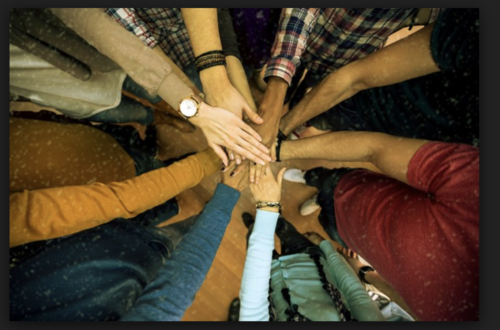
Strategies to Assist You on Your Journey Against Racism
Strategies to Assist You on Your Journey Against Racism
 The Black Lives Matter movement has probably increased your awareness of racism and prompted you to reconsider some of your own beliefs, attitudes, and behaviors. A little self-reflection may reveal some unpleasant truths, such as the ways in which you may be harboring racist thoughts or engaging in racist behavior without realizing it. This self-reflection may also be accompanied by feelings of guilt and shame; therefore, it is essential to begin with forgiveness.
The Black Lives Matter movement has probably increased your awareness of racism and prompted you to reconsider some of your own beliefs, attitudes, and behaviors. A little self-reflection may reveal some unpleasant truths, such as the ways in which you may be harboring racist thoughts or engaging in racist behavior without realizing it. This self-reflection may also be accompanied by feelings of guilt and shame; therefore, it is essential to begin with forgiveness.
Modern racism exists due to the current conditions into which we were all born. While we did not have a hand in designing the current state of affairs, we do have a hand in helping to fix the problem.
Fortunately, there are steps you can take to begin a journey against racism. Raising your awareness of your own prejudices and stereotypes can be crucial to overcoming obstacles.
1. Recognize Contemporary Racism Exists
Despite the belief of some that anti-discrimination laws have eradicated racism from society, research indicates otherwise.
Ethnic minorities continue to face considerable prejudice and discrimination. According to studies, minorities are:
1. less likely to receive adequate medical treatment.
2. Times less likely to receive job offers.
3. Are punished more severely for their crimes.
4. Four times more likely to be shot by police.
5. 5 is viewed with greater suspicion in public.
These are only a few instances. Clearly, numerous individuals encounter racism on a daily basis in a variety of ways.
Therefore, it is essential to acknowledge that discrimination against minorities persists. Recognizing the existence of racism is the first step in effecting positive change.
Consider the perspectives of others. Be willing to listen with an open mind when hearing the circumstances and narratives of others.
2. Recognize Your Prejudice
If you have thoughts such as “I would never do anything racist,” you may want to examine your behavior. People who claim they are never prejudiced are the most likely to be prejudiced, according to research.
A 2019 study published in Personality and Individual Differences found that “individuals who overestimated their level of egalitarianism tended to be the least egalitarian.”
Participants were asked to rate their level of racial egalitarianism in comparison to other individuals. Then, they expressed how positively they viewed Black employees in the workplace. The participants then completed the Implicit Association Test to assess their implicit racial biases.
Researchers discovered that those who self-reported as being the most egalitarian exhibited the highest levels of implicit racism against Black people.
Similar findings have been found in additional research. Individuals from privileged groups are more likely to deny the existence of prejudice.
Moreover, there is a perception among young people that racism is “not that bad anymore” or that it only occurs in extreme circumstances.
Some believe that prejudice against whites is a greater cause for concern than racism against blacks.
Remember that no one is completely prejudiced or without prejudice. It is a continuum, and everyone has stereotypes and biases that influence their interactions with individuals of other races.
It is essential to remember that our brains are wired to recognize differences, a trait that evolved to protect us from global threats. Our biases continue to operate on this same internal system.
3. Take a Test to Determine Your Prejudices
Project Implicit is a non-profit organization that assists individuals in recognizing their implicit biases. They offer a free test that can help you uncover unconscious thoughts and feelings about people of different races.
On the surface, you may believe you are tolerant of people of all races. But the truth is that you probably hold some prejudices and stereotypes that you may not even be aware of.
Take this free test to learn more about your concealed biases.
It can be beneficial to take this type of test, but it is also important to remain vigilant in order to identify and challenge any potential biases. Considering the reactions of others to your interactions can also be beneficial. For instance, if someone appears to be offended by something you said or did, inquire further.
4. Find Out About Yourself
You may believe that you should begin your anti-racism journey by learning about others. But increasing your self-awareness can be crucial to gaining insight into your beliefs.
A 2009 study published in the International Journal of Cultural Relations found that exploring one’s own historical roots and values can increase cultural competence.
Developing a deeper understanding of your ancestors and their experiences, as well as considering how your family operates as a unit, can assist you in recognizing how these have affected you. It can increase your awareness of your own biases and pique your interest in other cultures and races.
In her book The Body is Not an Apology, Sonya Renee Taylor promotes radical self-love, which entails loving your body and your whole authentic self. She believes that a portion of our prejudices stem from personal shortcomings. We can then improve as a society if we learn to accept ourselves more authentically.
Consider enrolling in individual therapy to explore the issue of prejudice and racism as a second method for discovering more about yourself.
5. Learn about other individuals
Additionally, educate yourself about other races. Learn about the history of racism and discrimination, and make an effort to gain a deeper understanding of what others are experiencing today.
Read books, watch films, and critique articles that describe the experiences of others.
You are not limited to scientific journals and documentaries alone. Many works of fiction may also provide insight into unfamiliar settings.
Obtain your news from various sources. When you watch the same channel and read articles from the same website, you only have one perspective. You will see that there are many ways to tell the same story if you learn from a variety of people.
6. Interact With Individuals of Various Races
No substitute exists for firsthand experience. Most insight can be gained by conversing with people who are different from you, working with people of other races, and interacting with them in a variety of situations.
Listening to others will teach you a great deal. But do not request that they teach you about racism. Asking them to do more work, or to essentially explain their daily experiences, increases their burden.
You may also need to intentionally engage in new activities in order to interact with people outside your typical social circle. Volunteer, join a club, or attend an event you would not ordinarily attend in order to meet new people.
When permitted, you may also travel to various regions of the United States and foreign countries. In addition to organizing and hosting cultural events and festivals, a number of organizations do so as well.
7. Register for a Course
Whether you enroll in an online course or a college course, diversity education can help you reduce your prejudice.
A 2001 study published in the Journal of Personality and Social Psychology discovered that students enrolled in a seminar on prejudice and conflict displayed significantly less explicit and implicit anti-Black bias than the control group.
This study demonstrates that biases can be altered, even those that appear to be automatic. Understanding your stereotypes can significantly diminish your prejudice. A 2012 study corroborates these findings, suggesting that anti-discrimination training and intervention could result in substantial and lasting reductions in implicit racial bias. 11
The following resources can help reduce racial bias:
- Check online or with your local college to see if they offer diversity-related courses or diversity-related activities.
- There has also been a recent explosion in educational and informative content about racial issues.
- The public can access a variety of free programs and webinars online.
- There are also courses offered by a number of independent scholars.
- In addition, local libraries frequently offer book clubs and programs that promote diversity and racial understanding.
- Ideally, you would adopt a comprehensive strategy as opposed to selecting only one or two of these options. Challenging and actively combating prejudice is a psychologically demanding and long-term commitment; therefore, the more resources you have to support your efforts, the better.
You may find it helpful to speak with a professional from a different cultural background if you’re having difficulty on your journey to become anti-racist. Reach out to individuals from diverse cultural backgrounds and participate in the activities they find meaningful. With the hobbytwin app, you can meet people from all walks of life who share your interests. In addition, a licensed mental health professional can assist you in identifying the thoughts, feelings, and behaviors you wish to alter and may be able to provide you with additional learning and development resources.
Download the hobbytwin app and tell a friend for instant hobby matching:
For iPhone/iPad&iPod:









